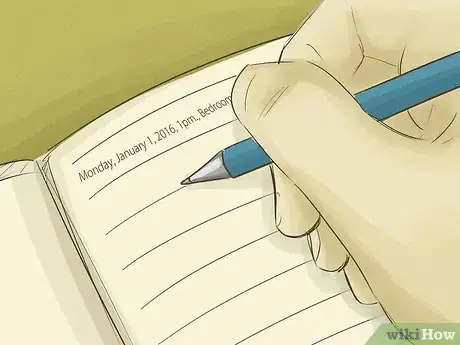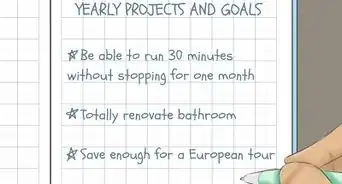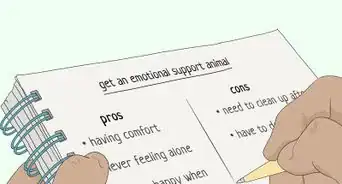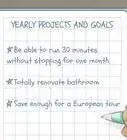This article was co-authored by Catherine Boswell, PhD. Dr. Catherine Boswell is a Licensed Psychologist and a Co-Founder of Psynergy Psychological Associates, a private therapy practice based in Houston, Texas. With over 15 years of experience, Dr. Boswell specializes in treating individuals, groups, couples, and families struggling with trauma, relationships, grief, and chronic pain. She holds a Ph.D. in Counseling Psychology from the University of Houston. Dr. Bowell has taught courses to Master’s level students at the University of Houston. She is also an author, speaker, and coach.
There are 9 references cited in this article, which can be found at the bottom of the page.
wikiHow marks an article as reader-approved once it receives enough positive feedback. In this case, 100% of readers who voted found the article helpful, earning it our reader-approved status.
This article has been viewed 215,207 times.
Journal writing is a creative form of recording your feelings free from the fear of judgement or criticism. Writing in a journal can allow you to work through complex issues in your life, exploring them thoroughly and candidly. It can also be a way of relieving stress, rather than inadvertently taking out your unexplored feelings on someone else. See Step 1 below to start writing your own journal.
Steps
Journal Entry Template
Starting Your Own Journal
-
1Find something to contain your journal entries. Traditionally, people who kept journals used literal, physical journals - small paper notebooks. You may want to use a cheap spiral or composition notebook or opt for a nicer hardcover journal. Today, however, a variety of additional digital options are also available. Any sort of computer program that allows you to input and save text is a potential journal - conventional word processors work well, as do free cloud-based writing programs like Google Docs.[1]
- If you're looking at computer-based options for your journal, you might want to consider starting a blog - essentially an online journal that other people can read. A variety of free blog sites exist, some of which allow you to control who can and cannot read your blog.
-
2Start your first entry by setting the scene. To begin writing in your journal, label your first entry with the date, time and, optionally, location. For instance, you might start with "Monday, January 1, 1.00p.m., Bedroom". Next, if you'd like to, write a salutation. Many journal-writers like to use "Dear Journal" or a similar greeting to start each entry. However, this is completely optional.[2]
- If you're writing a blog, you may want to begin by addressing your readers.
Advertisement -
3Write! Let your emotions flow![3] There's no right way to write in your journal - however you feel in the moment is how you should write. In terms of subject matter, don't hold back - no topic is off limits. Your feelings, your dreams, your crush, your family life, and much more are topics you might consider exploring.[4] Or, if you're feeling pretty average, you might just describe your day! Let your heart flow through your pen or keyboard. Get your true feelings down on the page - don't settle for anything less.
- As an exception to this rule, if you're writing a blog, while you'll want to be open with your emotions, consider your audience. You may want to consider censoring your most intense and/or personal thoughts.
-
4Develop a routine.[5] Journals are best if they're added to frequently. Writing often allows you to keep constant, ongoing record of your thoughts and feelings.[6] So, keep writing! It's easy to lose steam after the first few enthusiastic entries, but the benefits of keeping a journal are greatest if you can manage to make a routine of it.[7]
- Many journal-writers like to add an entry every night before bed. This is a healthy routine because it allows the writer to relax and unwind at the end of the day by "letting out" any lingering emotions. Be sure to write honestly, don't overthink it, and stay focused.
-
5Re-read your past entries for insights. Why write your thoughts down if you never intend to read them? It's always good to take a few minutes every once in a while to look at your finished work. You may be surprised by how you felt in the past! Being able to assess your past thoughts and emotions objectively with the benefit of being separated from them by time can give you insights into how to proceed with your life in the future.
- Use your past entries to reflect on your life. As you read, ask yourself questions like, "Am I the same person who wrote this entry?", "Is my life going the way I want it to?", and "How can I work to solve any problems that may have been troubling me when I wrote this entry?"
-
6Give your journal some personal style. Each entry in your journal should be uniquely "you". Unless you're keeping a journal solely to record the empirical facts of each day (miles walked, tasks completed, etc.), you should try to have fun with your journal entries! Add doodles in the margins, lyrics, movies reviews, and anything else you want - it's all up to you![8]
-
7Take your journal with you as you travel. If you don't have your journal, you can't write in it! Travel is one of the best opportunities for journal writing - long days spent in planes, trains, and automobiles offer plenty of chances to write at length, and the unique experiences you often find yourself in while traveling practically beg for comment. Write frequently as you travel and be a constant observer - keep your eyes and ears open for new sensations and experiences so that you can write about them.[9]
- The experiences you have while travelling can be some of the most influential ones in your life. Discovering the beauty of nature, making a friend in a far-off place, and even simply leaving your home can shape you, so document these things!
-
8Customize your journal. Unless your want your journal to be as plain and unassuming as possible (which is a legitimate option if you're worried about other people reading it), experiment with customizing your journal. The exact way you do so is up to you! If your journal is a notebook, for instance, you may want to decorate the outside with drawings or stickers. Inside, you may want to include photographs, newspaper clippings, pressed flowers, and more![10]
- If you're using a digital journal, like a blog, try adding photographs to your posts, including links, and choosing colorful templates.
Writing Great Journal Entries
-
1Think of your journal as a safe place to express yourself. Unless your journal is a blog that's open to the entire internet-browsing public, you should probably assume that no one will read it but you. If you choose to share it later, it'll be up to you to do so, but a journal is perfectly useful even if it's never shared. Try to consider your journal as a "safe haven" for your innermost thoughts. It's a place where you won't have to worry about being judged or embarrassed about the way you feel, so have no shame while you write.[11]
-
2Write what you think as soon as you think it. Most people have internal thoughts that they "filter" whenever they interact with other people. If you meet an ugly person on the street, for instance, you would never blurt out that you find them ugly - instead, you choose which thoughts to let out and which thoughts to keep in. The trick to good journal writing is to "turn down" or even "turn off" this filter. This can be tricky - often, its' something people don't have a lot of experience doing.[12]
- If you're having trouble turning off your filter, try writing "free form" as an exercise - scrawling your thoughts down in a stream-of-consciousness form the moment they come to you, whether they make sense or not.
-
3Comment on past journal entries. While you'll want each journal entry to stand up on its own merits, you may find that your entries can be made better by explicitly referencing past entries. By searching for explanations of why you wrote the way you did previously, you can come to a greater understanding of your own emotions.
- For instance, were you in a miserable mood when you wrote yesterday, but are now feeling better? Comment on this! By doing so, you may start to understand why you felt this way in the first place.
-
4Use writing prompts when you're bereft of ideas. Not every day will be eventful. Writing won't always come easy. Instead of giving up for the day, try, instead, to answer any one of the hundreds (if not thousands) of journal prompts available online. Writing educators occasionally use journal-writing as an academic exercise - when they do, they sometimes share the writing prompts for the exercise online. A simple search engine query like "journal writing prompts" can yield dozens of interesting results. Use the tools at your disposal for consistent journal greatness![13]
- You may find that, by pursuing a prompt, your writing ventures into interesting new areas you might otherwise never have explored. Be adventurous and pursue these new topics to your heart's content!
-
5Learn from the greats! Many famous and highly influential books are either the actual journals of real people or works of fiction written in the form of a journal. Both can help you become a great journal writer. Below are just a few of the works you may want to consult for inspiration:
- The diary of Samuel Pepys
- The Diary of a Young Girl (Anne Frank's diary)
- The diary of Jemima Conduct
- The diary of Franz Kafka
- Bridget Jones's Diary
- Diary of a Wimpy Kid
- The Color Purple
- Flowers for Algernon
- Dracula
- Gentlemen Prefer Blondes
Expert Q&A
Did you know you can get expert answers for this article?
Unlock expert answers by supporting wikiHow
-
QuestionHow do I start writing a journal?
 Catherine Boswell, PhDDr. Catherine Boswell is a Licensed Psychologist and a Co-Founder of Psynergy Psychological Associates, a private therapy practice based in Houston, Texas. With over 15 years of experience, Dr. Boswell specializes in treating individuals, groups, couples, and families struggling with trauma, relationships, grief, and chronic pain. She holds a Ph.D. in Counseling Psychology from the University of Houston. Dr. Bowell has taught courses to Master’s level students at the University of Houston. She is also an author, speaker, and coach.
Catherine Boswell, PhDDr. Catherine Boswell is a Licensed Psychologist and a Co-Founder of Psynergy Psychological Associates, a private therapy practice based in Houston, Texas. With over 15 years of experience, Dr. Boswell specializes in treating individuals, groups, couples, and families struggling with trauma, relationships, grief, and chronic pain. She holds a Ph.D. in Counseling Psychology from the University of Houston. Dr. Bowell has taught courses to Master’s level students at the University of Houston. She is also an author, speaker, and coach.
Licensed Psychologist
Warnings
- Always keep it in a safe no-one-knows box of secrets after writing. It's best if it has a lock.⧼thumbs_response⧽
- If this person does and reads it, confront them and tell them you absolutely do not want them to read it. Then take necessary precautions, such as getting a notebook with a lock.⧼thumbs_response⧽
- Your secrets may be posted around the net if you don't lock it. (This is for blog authors only.)⧼thumbs_response⧽
- Someone could find out about your journal.⧼thumbs_response⧽
Things You'll Need
- A cheap but good composition notebook.
- A working pen or pencil.
- Colouring in pens or pencils.
References
- ↑ https://docs.google.com/
- ↑ https://psychcentral.com/blog/ready-set-journal-64-journaling-prompts-for-self-discovery
- ↑ https://www.psychologytoday.com/us/blog/mindful-musings/201611/3-reasons-let-yourself-feel-your-emotions
- ↑ Catherine Boswell, PhD. Licensed Psychologist. Expert Interview. 29 December 2020.
- ↑ https://www.writersdigest.com/editor-blogs/guide-to-literary-agents/7-writing-routines-that-work
- ↑ Catherine Boswell, PhD. Licensed Psychologist. Expert Interview. 29 December 2020.
- ↑ https://www.theguardian.com/lifeandstyle/2014/mar/22/how-to-start-journal-writing-drawing
- ↑ https://www.theguardian.com/lifeandstyle/2014/mar/22/how-to-start-journal-writing-drawing
- ↑ https://www.washingtonpost.com/travel/tips/travel-photos-journal-memories-/
- ↑ https://www.theguardian.com/lifeandstyle/2014/mar/22/how-to-start-journal-writing-drawing
- ↑ https://www.urmc.rochester.edu/encyclopedia/content.aspx?ContentID=4552&ContentTypeID=1
- ↑ https://www.urmc.rochester.edu/encyclopedia/content.aspx?ContentID=4552&ContentTypeID=1
- ↑ https://psychcentral.com/blog/ready-set-journal-64-journaling-prompts-for-self-discovery#the-journal-prompts
About This Article
To write a journal entry, start by writing down the date, time, and location where you're writing. Then, let your emotions flow and write about your feelings, like your family life, crush, or dreams. Try not to overthink it by writing things down as soon as they come into your head. You can also use writing prompts. To make your entries as useful as possible, get into a routine of writing regularly. Then, review your past entries to assess your feelings with the benefit of hindsight. To see a list of some famous journal writers and get tips on how to decorate your journal, read on!













































































